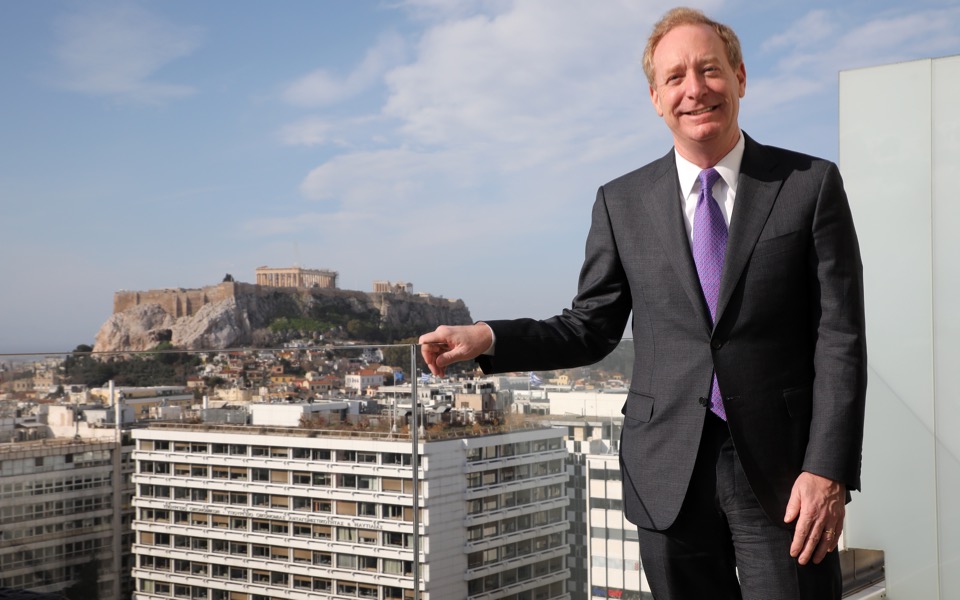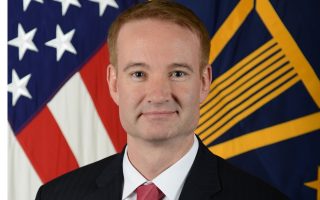Technology could help Greek economy grow, Microsoft chief tells Kathimerini

Digital technology could be an integral part of Greece’s economic growth as well as efforts to modernize the state apparatus, Microsoft President Brad Smith told Kathimerini in an interview on the occasion of his recent visit to Athens during which he met with Prime Minister Kyriakos Mitsotakis.
Among other things, Smith and Mitsotakis agreed on a collaboration between the American tech giant and the Greek Ministry of Culture for the promotion of Ancient Olympia – which the Microsoft president visited – as part of the global “AI For Good” program.
They also discussed other ways of strengthening the promotion of Greece’s cultural heritage and bolstering the educational system with innovative digital applications.
The author of “Tools and Weapons: The Promise and the Peril of the Digital Age” (whose prologue is written by Bill Gates) talks about the need for better protection of privacy and personal data via strict laws governing corporations and the internet. He also notes the possibilities arising thanks to advances in artificial intelligence, while stressing the need to address internet accessibility and retrain the labor force in new technologies.
You’re one of the tech giants, not a health provider, but I’m wondering what you think about the new coronovirus and its impact, on a human and a business level. Can technology help in dealing with it?
I think technology can help. We all have to start with the basic recognition that we’re all human beings and we’re all affected by this. As a company, we have to think about it on a few different levels. Obviously, we’re focused on it for the health and safety of our employees around the world and what it means for our customers, So, we’re following very closely. You know, it’s having some impact on our business, just as it has for the other tech companies. We revised our financial guidance over the last 12 hours, even, just stating that we’re revising our forecast in the area of our business that’s based on the sale of PCs, because of the impact on the supply chain from China.
We’ve been involved in China itself, because that’s where the humanitarian impact has been felt first and foremost. We provide support for NGOs that are providing humanitarian assistance. We’re making our technology available free of charge.
I think we all have to hope that a vaccine will be developed quickly. The latest that we’re hearing is that people are optimistic that there will be a vaccine before the end of this year. But if it can be pulled forward to, say, September or something, we would all be in better shape. And I think we’ll have to see what it means for international meetings and the like. I think there’s a lot of uncertainty.
Let me move to your visit in Greece. You met with the prime minister in Davos and now again in Athens. Is this a follow-up visit to your initial discussions in Davos?
Well, we had the opportunity first to meet with the prime minister in Davos. Every year in Davos I have the opportunity meet with typically between 45 and 50 different individuals, you know, prime ministers, heads of governments, politicians, CEOs, journalists and the like. And it’s interesting. I’m not saying this just because I’m in Greece today. When we sat down afterwards and we thought, you know, who really made an impression on us, the prime minister was really at the top of the list. And he came in with a clear sense of purpose, a desire to move things forward.
I think it’s really a positive time for Greece. You know, it’s exciting for all of us who follow what happens here. And that is for a company like Microsoft, we follow countries around the world, to see this government with a majority in Parliament, to see the focus on, I think, the potential real resurgence of the economy here. This is a good time. You know, it’s a good time for us to invest. It’s a good time for others to invest.
And that’s one of the reasons that I’m here, just basically a month after having met in Davos. We believe that digital technology can be a part of what moves the Greek economy forward. We believe it can modernize the government. We believe it creates both the opportunity and need to think about the next generation of skills that people will need in order to help move the economy forward. And as you know, we're excited about what technology can do around the world, not just to preserve, but to promote the cultural heritages of the planet…
Greece stands for culture, Microsoft stands for technology. How can the two come together?
With the prime minister we examined new ways to enhance the country’s cultural heritage and upgrading education through cutting edge applications. In that context we agreed on establishing a collaboration between Microsoft and the Ministry of Culture, on a project for the archaeological site of Ancient Olympia which will be part of Microsoft’s global “AI for Cultural Heritage” initiative. We want to be very sensitive and respectful of how Greek citizens in the Greek government really protect and promote Greek heritage. At the same time, we are also running a very important project with the French Ministry of Culture. Last year, we brought augmented reality into a museum in Paris. We worked with the French government to share it in the United States and promote tourism at Mont-Saint-Michel, which is one of the great cultural icons of France. So yes, we do believe that technology tools have an exciting role to play when it comes to culture.
People are very sensitive about their cultural monuments. How are you planning to work around that?
I think the first principle for us is to offer to do something that we think will be useful, but let others make the decision. You know, we don’t have any interest in going where people want to do something different. We created this program last year called AI for Cultural Heritage. And it really focuses on the preservation of languages, of artifacts, of places, the celebration of peoples. What I found most interesting is that it actually is proving to be relevant and even important everywhere in the world. I’m very excited about what came out of the collaboration in France, because what it is doing is both enabling people who visit Mont-Saint-Michel, or a museum in Paris to understand the site over a period of time. It’s a bit like a time machine and it can take people back in time and help them see with their own eyes what a place looked like centuries or many centuries ago. But it can also be very important in promoting tourism, and for any economy that has tourism as an important element, I think that is useful as well. This for us is not a for-profit part of the company, it’s part of the philanthropic work that we do. I think the first principle needs to be to recognize that for every country and culture, this is their heritage and it needs to be an opportunity for the people in that country to decide how they want to preserve and promote their heritage. And if we can be helpful, that’s good. And if they want to do it in a different way, it’s their heritage, not ours.
Data and AI are major themes in today’s world. Should we be worried about these developments?
I think that AI offers some exciting opportunities. You talk about healthcare, you talk about curing cancer – there are incredibly important things that it will help us do. It will help us address climate change. But it’s also creating new challenges. And I think it’s right to acknowledge that explicitly. One of the things that we do – we do it in our book – is compare artificial intelligence to the combustion engine. A hundred years ago, whether we were in Greece or the United States or anywhere else, there were millions of people with jobs that were based on taking care of horses, feeding horses, using horses and building wagons that were pulled by horses, and the combustion engine changed all of that. And there were some jobs that were eliminated. New jobs were created. So, certainly one of the priorities for us is to invest in skilling initiatives.
This transformation is not happening as equitably as it could. How can Microsoft or others work on that side to make it fairer?
I think we have to recognize your basic point, that we live in a world of many inequalities. I would say that there’s two inequalities that go very directly to the technology sector. One is what I would call internet inequality. This is the fact that about 55 percent of the people on this planet have access to the internet. Forty-five percent do not. If you look at it in terms of broadband speeds, most people do not. And I think we need to recognize that it’s fundamental to the future to bring broadband everywhere on the planet. We’re going to see in this decade the planet surrounded by low earth orbiting satellites. And if you can combine new wireless technologies on the ground with this new generation of satellite connectivity, we really do have the opportunity to connect the planet, but we need to do that.
Privacy is a huge issue in your book – and for all of us, for that matter. We know what everybody else does, eats, votes for. Is AI unethical?
Privacy is a value and a virtue that we need to work hard and even harder to preserve and protect. Different generations or countries think about it differently. But, certainly, there are more challenges to privacy in the world today than probably at any point in human history. When we look at the ability of a government, for example, potentially to monitor not just what we’re writing, but what we’re reading and what we’re watching now, that’s a privacy concern. When we think about what facial recognition could bring to cities around the world in terms of mass surveillance, that’s a concern. It is a concern that requires strong laws, because I don’t believe there’s any way to protect privacy without strong laws.
But will the big companies work with governments to do that?
I don’t know whether all will, but I think some will and certainly we will. It’s a little bit easier because our business model doesn’t involve the kind of targeted advertising to anything like the degree that some other companies have. I think it does require a level of self-restraint, of responsibility. I was reminded, being here in Greece, about the four great values and virtues articulated by Aristotle. It was temperance, fortitude, courage, magnanimity.
With respect to accusations of Russian involvement in the US and other elections, are we protected this time around?
There’s no doubt that people are better prepared for 2020 than they were for 2016 in the US, when it comes to threats to democracy, to candidates and to elections. First, we’re well aware of the danger. It really did not become apparent until after the 2016 election just how broad the Russian activity was. We actually highlight it in our book, the way it emerged in July of 2016. And we were quite possibly the first company to jump on this and just start to take action to try to address this kind of interference. But it wasn’t until 2017 that we or anyone completely understood it. I think there’s more safeguards in place. There are more safeguards at the governmental level. If you look at a company like Microsoft, we built a defending democracy program. We have a program like AccountGuard that is protecting candidates from the hacking of their emails. We have new initiatives around disinformation and the protection of elections.
What are your thoughts on populism and fake news?
I would separate the two, actually. We should have concerns about disinformation efforts and about the potential rise of even more sophisticated fraudulent efforts to mislead people, because that’s fundamentally what we’re talking about. We should be worried about deep fakes and I think we’re going to need new technical protections to address them. These can connect with any side of the political spectrum. And, obviously, we live in a time where there is populism, there’s nationalism, there’s populism from the right, there’s populism from the left.
Will globalization survive? Given all these nationalist trends?
It’s a really important question. And when you really step back and think about the world today, the geopolitics of our time are really in some ways pulling countries apart. Populations are pulling inward. I think one reason they’re pulling inward is that people are worried that their own people are being left behind. And this connects back to the inequalities of our time that are rooted in technology. At the same time, there are some very powerful forces that bring countries and peoples together. Technology is one of them. I think the fact that technology brings people together at a time when people are trying to pull apart is why technology is in the crosshairs to some degree. If we look to the decade ahead and we ask, “What are going to be the most important issues of this decade?” I think the one issue that will just become more and more and more important every year is the climate.
Of course people have to recognize the problem first.
Yes, you do have to recognize the problem.
Some don’t.
Yes, although it’s been interesting, because even in the US, where there has been more of a political force for rejecting the problem, I’m increasingly finding that, across the political spectrum, people are more likely to acknowledge it. What they are worried about is that our solutions will have a disproportionately negative impact on the very people who are most being left behind today.





